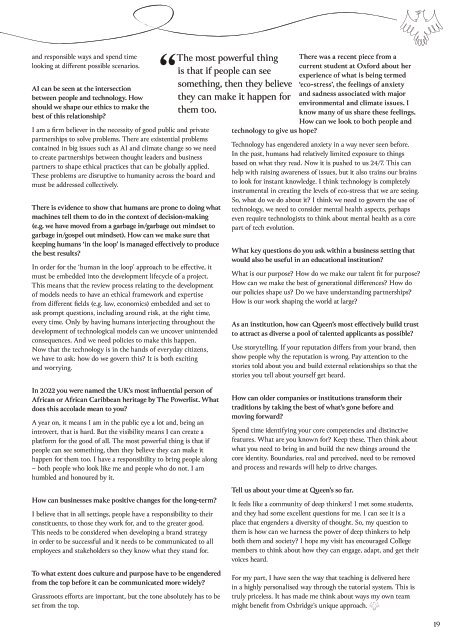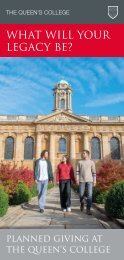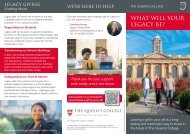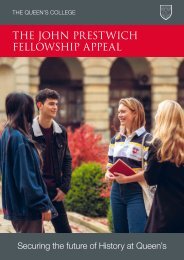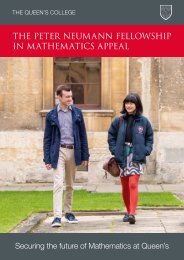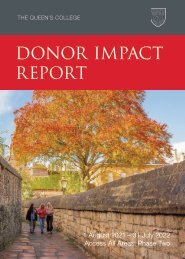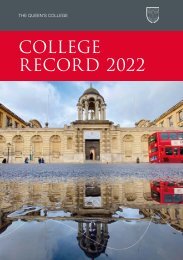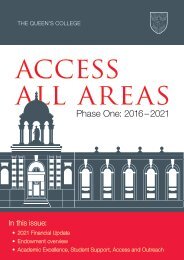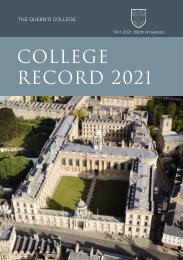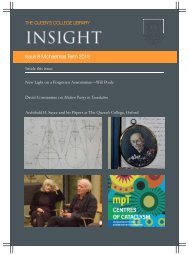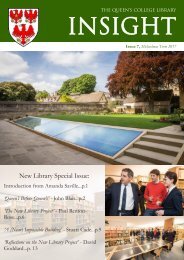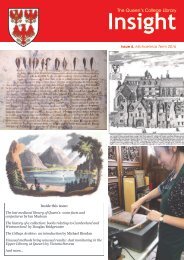Eagle Eye Magazine Issue 1 2023
Take a dive into the research and work that's going on at The Queen's College and beyond its walls within the community of Old Members. In issue one, we celebrate Shakespeare's First Folio, ask our history Fellows what makes them passionate about their subject, explore the new accessible Porters' Lodge, ask a current student about how to engage positively with climate issues, and much more.
Take a dive into the research and work that's going on at The Queen's College and beyond its walls within the community of Old Members. In issue one, we celebrate Shakespeare's First Folio, ask our history Fellows what makes them passionate about their subject, explore the new accessible Porters' Lodge, ask a current student about how to engage positively with climate issues, and much more.
You also want an ePaper? Increase the reach of your titles
YUMPU automatically turns print PDFs into web optimized ePapers that Google loves.
and responsible ways and spend time<br />
looking at different possible scenarios.<br />
AI can be seen at the intersection<br />
between people and technology. How<br />
should we shape our ethics to make the<br />
best of this relationship?<br />
I am a firm believer in the necessity of good public and private<br />
partnerships to solve problems. There are existential problems<br />
contained in big issues such as AI and climate change so we need<br />
to create partnerships between thought leaders and business<br />
partners to shape ethical practices that can be globally applied.<br />
These problems are disruptive to humanity across the board and<br />
must be addressed collectively.<br />
There is evidence to show that humans are prone to doing what<br />
machines tell them to do in the context of decision-making<br />
(e.g. we have moved from a garbage in/garbage out mindset to<br />
garbage in/gospel out mindset). How can we make sure that<br />
keeping humans ‘in the loop’ is managed effectively to produce<br />
the best results?<br />
In order for the ‘human in the loop’ approach to be effective, it<br />
must be embedded into the development lifecycle of a project.<br />
This means that the review process relating to the development<br />
of models needs to have an ethical framework and expertise<br />
from different fields (e.g. law, economics) embedded and set to<br />
ask prompt questions, including around risk, at the right time,<br />
every time. Only by having humans interjecting throughout the<br />
development of technological models can we uncover unintended<br />
consequences. And we need policies to make this happen.<br />
Now that the technology is in the hands of everyday citizens,<br />
we have to ask: how do we govern this? It is both exciting<br />
and worrying.<br />
“The most powerful thing<br />
is that if people can see<br />
something, then they believe<br />
they can make it happen for<br />
them too.<br />
There was a recent piece from a<br />
current student at Oxford about her<br />
experience of what is being termed<br />
‘eco-stress’, the feelings of anxiety<br />
and sadness associated with major<br />
environmental and climate issues. I<br />
know many of us share these feelings.<br />
How can we look to both people and<br />
technology to give us hope?<br />
Technology has engendered anxiety in a way never seen before.<br />
In the past, humans had relatively limited exposure to things<br />
based on what they read. Now it is pushed to us 24/7. This can<br />
help with raising awareness of issues, but it also trains our brains<br />
to look for instant knowledge. I think technology is completely<br />
instrumental in creating the levels of eco-stress that we are seeing.<br />
So, what do we do about it? I think we need to govern the use of<br />
technology, we need to consider mental health aspects, perhaps<br />
even require technologists to think about mental health as a core<br />
part of tech evolution.<br />
What key questions do you ask within a business setting that<br />
would also be useful in an educational institution?<br />
What is our purpose? How do we make our talent fit for purpose?<br />
How can we make the best of generational differences? How do<br />
our policies shape us? Do we have understanding partnerships?<br />
How is our work shaping the world at large?<br />
As an institution, how can Queen’s most effectively build trust<br />
to attract as diverse a pool of talented applicants as possible?<br />
Use storytelling. If your reputation differs from your brand, then<br />
show people why the reputation is wrong. Pay attention to the<br />
stories told about you and build external relationships so that the<br />
stories you tell about yourself get heard.<br />
In 2022 you were named the UK’s most influential person of<br />
African or African Caribbean heritage by The Powerlist. What<br />
does this accolade mean to you?<br />
A year on, it means I am in the public eye a lot and, being an<br />
introvert, that is hard. But the visibility means I can create a<br />
platform for the good of all. The most powerful thing is that if<br />
people can see something, then they believe they can make it<br />
happen for them too. I have a responsibility to bring people along<br />
– both people who look like me and people who do not. I am<br />
humbled and honoured by it.<br />
How can businesses make positive changes for the long-term?<br />
I believe that in all settings, people have a responsibility to their<br />
constituents, to those they work for, and to the greater good.<br />
This needs to be considered when developing a brand strategy<br />
in order to be successful and it needs to be communicated to all<br />
employees and stakeholders so they know what they stand for.<br />
To what extent does culture and purpose have to be engendered<br />
from the top before it can be communicated more widely?<br />
Grassroots efforts are important, but the tone absolutely has to be<br />
set from the top.<br />
How can older companies or institutions transform their<br />
traditions by taking the best of what’s gone before and<br />
moving forward?<br />
Spend time identifying your core competencies and distinctive<br />
features. What are you known for? Keep these. Then think about<br />
what you need to bring in and build the new things around the<br />
core identity. Boundaries, real and perceived, need to be removed<br />
and process and rewards will help to drive changes.<br />
Tell us about your time at Queen’s so far.<br />
It feels like a community of deep thinkers! I met some students,<br />
and they had some excellent questions for me. I can see it is a<br />
place that engenders a diversity of thought. So, my question to<br />
them is how can we harness the power of deep thinkers to help<br />
both them and society? I hope my visit has encouraged College<br />
members to think about how they can engage, adapt, and get their<br />
voices heard.<br />
For my part, I have seen the way that teaching is delivered here<br />
in a highly personalised way through the tutorial system. This is<br />
truly priceless. It has made me think about ways my own team<br />
might benefit from Oxbridge’s unique approach.<br />
19


